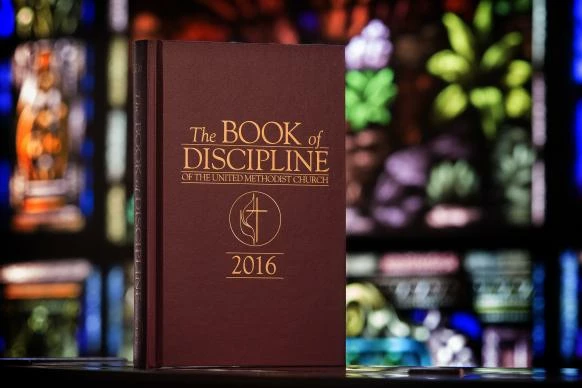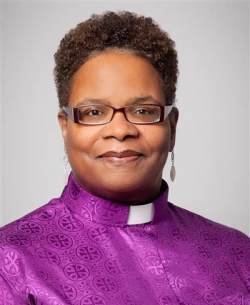There is a season for everything

Beloved,
We. Are. One.
 That was the title of the sermon I preached during my Installation in 2016 at First Hyattsville United Methodist Church. The Spirit led me to preach from Ephesians and emphasize our unity after listening to conversations throughout the conference. Further, as far back as I can remember, my hearing, understanding, and praxis of the Gospel message has centered upon our oneness in Jesus Christ.
That was the title of the sermon I preached during my Installation in 2016 at First Hyattsville United Methodist Church. The Spirit led me to preach from Ephesians and emphasize our unity after listening to conversations throughout the conference. Further, as far back as I can remember, my hearing, understanding, and praxis of the Gospel message has centered upon our oneness in Jesus Christ.
While it may seem contradictory, the new Protocol on Reconciliation and Grace Through Separation, now before the denomination, is the best and strongest way we can move forward honoring the Gospel and our call to make disciples of Jesus Christ for the transformation of the world. Crafted in a spirit of mutual respect, it lifts us out of the quagmire we’ve been stuck in for decades and sets us all, with integrity, on a path that brings honor and glory to God. Ecclesiastes teaches us a hard truth — that there is a time for every matter under the sun. The time for moving forward in new and separate expressions of Methodism is before us.
As a member of the 16-member mediation team, which included conservatives, moderates, progressives and bishops, I strongly urge you to read The Protocol with a discerning eye, putting aside preconceived inclinations towards defensiveness. If that is done, I believe you will discover the Holy Spirit is at work among us.
I was deeply honored to participate in the creation of The Protocol. I came to the process after it had already begun. During the November meeting of the Council of Bishops, I became aware of meetings that were taking place comprised of a broad constituency of committed laity, clergy, and episcopal leaders. After some in-depth conversation among the Council, it was decided that another female voice was needed at the table and I was asked if I would be willing to serve. I reluctantly agreed. I was reluctant because I have made it known that I was not willing to be a part of any group whose chief purpose was to dissolve the denomination or coerce persons to leave.
When I sat at table and saw the diversity represented there, I was heartened. Although not every single aspect of the denomination was present, it was a broad constituency representing very different theological viewpoints. I also immediately came to understand that they shared a consensus that remaining together was no longer a viable option. Therefore, each participant offered ideas and elements that were important to their caucuses and constituencies, and negotiated from that standpoint. While the conversation was intense, everyone made efforts to be considerate of the varying interests, needs, and the goal of separating with dignity. The Protocol of Reconciliation and Grace Through Separation is not perfect, just as no piece of legislation is perfect. But it does represent a viable foundation for developing legislation that will allow for an amicable separation with dignity.
As the Baltimore-Washington Conference, I invite us to read the entire Protocol and the accompanying documents with an open mind. Read it without imputing onto its authors any ill-intent or ignoble motive. Read it with the aftermath of the Special Session of General Conference in mind. Read it with the pain and harm that has been caused by our inability to live within contextual and theological freedom. Read it with an eye toward an opportunity to pour ourselves into mission and ministry without fear of LGBTQIA+ charges, trials, or exclusion.
As a result of The Protocol and my belief in the possibilities it holds, I will not be processing any charges pursuant to the new paragraphs of the Book of Discipline, which went into effect on January 1, 2020. There was unanimous consent among the mediation team, including the traditionalist voices at the table, that new rounds of charges and trials would not be helpful at this juncture. Rather, all such charges will be held in abeyance until after the General Conference.
It seems providential to me that the churches of the BWC are in the midst of the conference-wide study, “Who Are We: A Journey From Head to Heart,” which was designed to help us reflect upon our theological and scriptural grounding, our Wesleyan heritage, and our life together as the BWC. This study positions us perfectly to determine whether we want to remain within the post-separation United Methodist Church with the restrictive language about homosexuality removed, or go with the post-separation expression of Methodism that will retain those restrictions. Are we a conference grounded in liberation and inclusion, or restrictive practices? I pray that we see ourselves as the former. I believe our 236 years of bold mission and ministry, and our Christ-centered inclusion of all people, indicate that we are.
It has been shared with me by several conservative pastors and lay people in the BWC that they do not desire to align themselves with restrictive practices. They have made it clear that they will remain with The United Methodist Church if this plan passes at General Conference.
As anyone knows who has participated in the separation of any relationship, be it a marriage, a small business or a civic organization, it is never easy. The idea of separation tends toward the romantic; the reality of separation is anything but.
On the one hand, the cry from the members of The United Methodist Church has been to stop the pain, end the trials, and create an inclusive church where everyone is welcome. But it has become clear that many people in our church are not able to work faithfully and fruitfully alongside those with whom they disagree. An amicable separation is our best viable option. That is what the members of the mediation team attempted to create with The Protocol. It is being criticized because it was mediated in confidentiality. Confidentiality is not tantamount to evil. In this case, it was a tool, necessary to allow people with vastly different views to come together in a timely way to accomplish a critically important and time-sensitive task. Members of the team were tasked with communicating with their constituencies to inform the process. They did so, and the protocol now stands as the best work, and the best hope, of people across the broad theological spectrum of The United Methodist Church.
As we move toward the General Conference session in May, where The Protocol will be considered as legislation, I call all the people of the Baltimore-Washington Conference into a time of prayer and fasting. In the midst of these very logistical and strategic measures to ensure the future of the Church, we must never lose sight of the fact that we are first and foremost a spiritual people, called to be salt and light in an imperfect world.
“God of grace and God of glory, on thy people pour thy power. Crown thine ancient church’s story, bring her bud to glorious flower. Grant us wisdom, grant us courage, for the facing of this hour, for the facing of this hour.”
To God be the glory!
